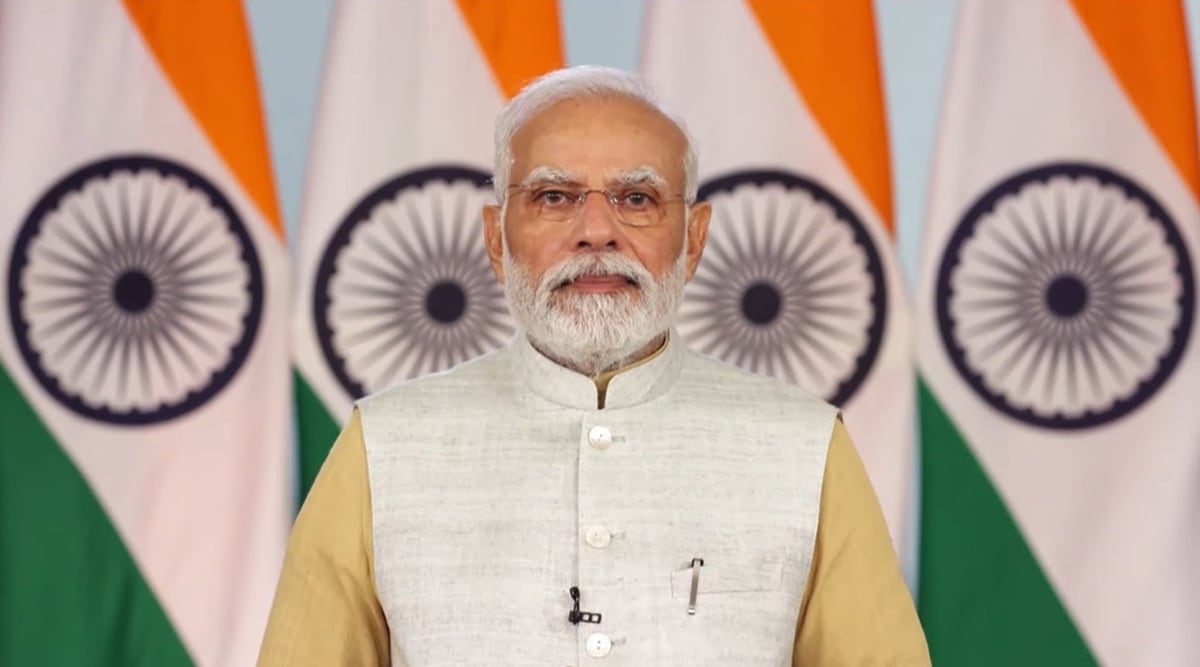 Prime Minister Narendra Modi (Twitter @BJP4India)
Prime Minister Narendra Modi (Twitter @BJP4India)Addressing the Second United Nations World Geospatial International Congress via video message on Tuesday, Prime Minister Narendra Modi said that steps taken by India over the past few years has been of empowering the “last person at the last mile’’, reflecting the theme of this year’s conference — ‘Geo-Enabling the Global Village: No one should be left behind’.
Inaugurated by Science and Technology minister Jitendra Singh in Hyderabad, the conference is being attended by UN representatives and international delegates, including UNGGIM Director Stefan Schweinfest.
Welcoming the international delegates to India, the Prime Minister said, “We have been working on a vision of Antyodaya which means empowering the last person at the last mile, in a mission mode. Four 450-million unbanked people, a population greater than that of USA, were brought under banking net and 135-million people, about twice the population of France, were given insurance. Sanitation facilities were taken to 110-million families and tap water connections to over 60-million households. India is ensuring no one is left behind.’’
The PM further pointed out that technology and talent are the two pillars that are key to India’s development journey. Technology brings transformation, he said, citing the example of JAM trinity which has delivered welfare benefits to 800-million people seamlessly and of the tech platform that powered the world’s largest vaccination drive.
“In India, technology is not an agent of exclusion. It is an agent of inclusion,” Modi said.
He highlighted the role of geospatial technology in driving inclusion and progress. The role of technology in schemes like SVAMITVA and housing, and the outcomes in terms of property ownership and women empowerment, have a direct impact on the UN’s Sustainable Development Goals on poverty and gender equality, he said. The PM GatiShakti Master Plan is being powered by geospatial technology, as is the Digital Ocean platform, the PM added. India has already set an example in sharing the benefits of geospatial technology, Modi stated, citing the example of the South Asia Satellite for facilitating communication in India’s neighbourhood.
“India is a young nation with great innovative spirit,” the PM said, highlighting the role of talent as the second pillar in India’s journey. India is one of the top startup hubs in the world, he added, with the number of unicorn startups having almost doubled since 2021 — a testimony to India’s young talent.
One of the most important freedoms is the freedom to innovate, said Modi, and this has been ensured for the geospatial sector.
“Collection, generation and digitisation of geospatial data have now been democratised. Such reforms have been accompanied with a boost to the drone sector and opening up of the space sector for private participation, along with 5G taking off in India…Global organisations like the United Nations can lead the way in taking resources to the last mile in every region,” he said.
Hand-holding and technology transfer are also crucial in fighting climate change, the Prime Minister added, suggesting that best practices may be shared for saving the planet.
Science minister Jitendra Singh said that India will play a critical role in the global economy by 2047 and “has jumped from rank 80 to 40 in the global innovation index in the last few years”.